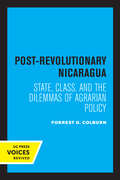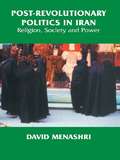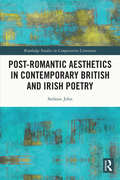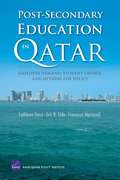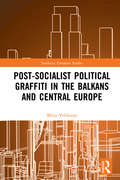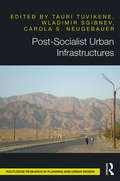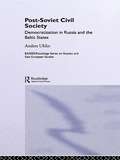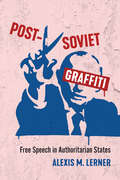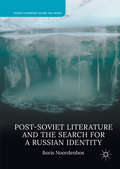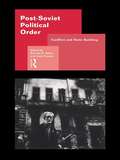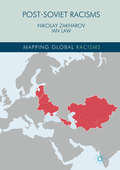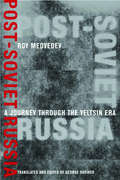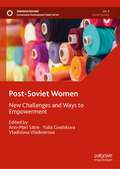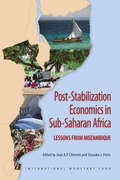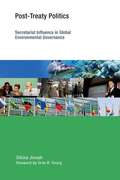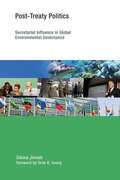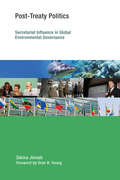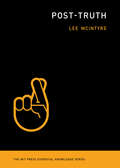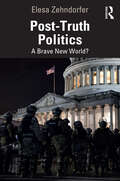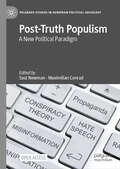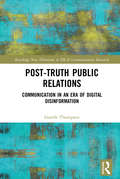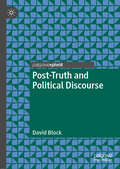- Table View
- List View
Post-Revolutionary Nicaragua: State, Class, and the Dilemmas of Agrarian Policy (California Series on Social Choice and Political Economy)
by Forrest D. ColburnThis title is part of UC Press's Voices Revived program, which commemorates University of California Press’s mission to seek out and cultivate the brightest minds and give them voice, reach, and impact. Drawing on a backlist dating to 1893, Voices Revived makes high-quality, peer-reviewed scholarship accessible once again using print-on-demand technology. This title was originally published in 1986.
Post-Revolutionary Politics in Iran: Religion, Society and Power
by David MenashriAfter the Islamic revolution in Iran, revolutionary leaders had to compromise their ideology. The Iranian ship of state continues to drift in search of an equilibrium between revolutionary convictions and the demands of governance, between religion and state, and Islam and the West.
Post-Romantic Aesthetics in Contemporary British and Irish Poetry (Routledge Studies in Comparative Literature)
by Stefanie JohnThis book demonstrates the legacies of Romanticism which animate the poetry and poetics of Eavan Boland, Gillian Clarke, John Burnside, and Kathleen Jamie. It argues that the English Romantic tradition serves as a source of inspiration and critical contention for these Irish, Welsh, and Scottish poets, and it relates this engagement to wider concerns with gender, nation, and nature which have shaped contemporary poetry in Britain and Ireland. Covering a substantial number of works from the 1980s to the 2010s, the book discusses how Boland and Clarke, as women poets from the Republic of Ireland and Wales, react to a male-dominated and Anglocentric lyric tradition and thus rework notions of the Romantic. It examines how Burnside and Jamie challenge, adopt, and revise Romantic aesthetics of nature and environment. The book is the first in-depth study to read Boland, Clarke, Burnside, and Jamie as post-Romantics. By disentangling the aesthetic and critical conceptions of Romanticism which inform their inheritance, it develops an innovative approach to the understanding of contemporary poetry and literary influence.
Post-Secondary Education in Qatar: Employer Demand, Student Choice, and Options for Policy
by Louay Constant Charles A. Goldman Cathleen Stasz Eric R. Eide Paco MartorellThe government of Qatar has made significant investments in post-secondary education to ensure that Qataris are able to contribute to the country's social and economic goals. The authors describe RAND's analysis of occupational demand and related post-secondary educational opportunities, and offer recommendations for improving the country's current provision of post-secondary education.
Post-Socialist Political Graffiti in the Balkans and Central Europe (Southeast European Studies)
by Mitja VelikonjaThis theoretically and empirically grounded book uses case studies of political graffiti in the post-socialist Balkans and Central Europe to explore the use of graffiti as a subversive political media. Despite the increasing global digitisation, graffiti remains widespread and popular, providing with a few words or images a vivid visual indication of cultural conditions, social dynamics and power structures in a society, and provoking a variety of reactions. Using qualitative and quantitative methods, as well as detailed interdisciplinary analyses of "patriotic," extreme-right, soccer-fan, nostalgic, and chauvinist graffiti and street art, it looks at why and by whom graffiti is used as political media and to/against whom it is directed. The book theorises discussions of political graffiti and street art to show different methodological approaches from four perspectives: context, author, the work itself, and audience. It will be of interest to the growing body of literature focussing on (sub)cultural studies in the contemporary Balkans, transitology, visual cultural studies, art theory, anthropology, sociology, and studies of radical politics.
Post-Socialist Urban Infrastructures
by Wladimir Sgibnev Tauri Tuvikene Carola S. NeugebauerPost-Socialist Urban Infrastructures critically elaborates on often forgotten, but some of the most essential, aspects of contemporary urban life, namely infrastructures, and links them to a discussion of post-socialist transformation. As the skeletons of cities, infrastructures capture the ways in which urban environments are assembled and urban lives unfold. Focusing on post-socialist cities, marked by neoliberalisation, polarisation and hybridity, this book offers new and enriching perspectives on urban infrastructures by centering on the often marginalised aspects of urban research—transport, green spaces, and water and heating provision. Featuring cases from West and East alike, the book covers examples from Azerbaijan, Bulgaria, Serbia, Croatia, Germany, Russia, Georgia, Lithuania, Poland, the Czech Republic, Tajikistan, and India. It provides original insights into the infrastructural back end of post-socialist cities for scholars, planners and activists interested in urban geography, cultural and social anthropology, and urban studies.
Post-Soviet Civil Society: Democratization in Russia and the Baltic States (BASEES/Routledge Series on Russian and East European Studies #Vol. 25)
by Anders UhlinThe development of civil society has varied greatly across the former Soviet Union. The Baltic states have achieved a high level of integration with the West and European Union membership, while some regions in Russia lag far behind. Now for the first time there is a comparative study of civil society and democratization across post-Soviet national borders. Acknowledging the enormous variation throughout the region, the book offers unique data on developments in Russia, Estonia, Latvia and Lithuania. Applying an innovative analytical framework derived from theories of democratization, civil society, social movements and transnational relations, the researchers have formulated broader comparisons and generalisations without neglecting the specific post-Soviet context. The book provides a systematic comparison across sectors as well as nations, and includes chapters on NGOs, the state and conflict, and transnationalisation. Quantitative survey data is combined with qualitative interviews and case study research to both confirm previous findings about the weakness of post-communist civil society and to qualify previous research.
Post-Soviet Graffiti: Free Speech in Authoritarian States
by Alexis LernerFor more than a decade, Alexis Lerner combed the alleyways, underpasses, and public squares of cities once under communist rule, from Berlin in the west to Vladivostok in the east, recording thousands of cases of critical and satirical political street art and cataloging these artworks linguistically and thematically across space and time. Complemented by first-hand interviews with leading artists, activists, and politicians from across the region, Post-Soviet Graffiti provides theoretical reflection on public space as a site for political action, a semiotic reading of signs and symbols, and street art as a form of text. The book answers the question of how we conceptualize avenues of dissent under authoritarian rule by showing how contemporary graffiti functions not only as a popular public aesthetic, but also as a mouthpiece of political sentiment, especially within the post-Soviet region and post-communist Europe. A purposefully anonymous and accessible artform, graffiti is an effective tool for circumventing censorship and expressing political views. This is especially true for marginalized populations and for those living in otherwise closed and censored states. Post-Soviet Graffiti reveals that graffiti does not exist in a vacuum; rather, it can be read as a narrative about a place, the people who live there, and the things that matter to them.
Post-Soviet Literature and the Search for a Russian Identity
by Boris NoordenbosThis book examines a wide range of contemporary Russian writers whose work, after the demise of Communism, became more authoritative in debates on Russia's character, destiny, and place in the world. Unique in his in-depth analysis of both playful postmodernist authors and fanatical nationalist writers, Noordenbos pays attention to not only the acute social and political implications of contemporary Russian literature but also literary form by documenting the decline of postmodern styles, analyzing shifting metaphors for a "Russian identity crisis," and tracing the emergence of new forms of authorial ethos. To achieve this end, the book builds on theories of postcoloniality, trauma, and conspiracy thinking, and makes these research fields productively available for post-Soviet studies.
Post-Soviet Political Order
by Jack Snyder Barnett R. RubinPost-Soviet Political Order asks what is shaping the institutional pattern of the post-Soviet political order, what the new order will be like, what patterns of conflict are emerging, and what can be done about stabilising the region. In considering these questions the contributors converge on four common themes:* the institutional legacy of empire* the social processes unleashed by imperial collapse* patterns of bargaining within and between states to resolve conflicts arising out of the imperial collapse* the impact of the wider international setting on the pattern of post-imperial politicsFocusing on the former Soviet Union and Eastern European countries, the contributors show how strong state institutions are essential if conflict and political instability are to be avoided.
Post-Soviet Power
by Susanne A. WenglePost-Soviet Power tells the story of the Russian electricity system and examines the politics of its transformation from a ministry to a market. Susanne Wengle shifts our focus away from what has been at the center of post-Soviet political economy corruption and the lack of structural reforms to draw attention to political struggles to establish a state with the ability to govern the economy. She highlights the importance of hands-on economic planning by authorities post-Soviet developmentalism and details the market mechanisms that have been created. This book argues that these observations urge us to think of economies and political authority as mutually constitutive, in Russia and beyond. Whereas political science often thinks of market arrangements resulting from political institutions, Russia's marketization demonstrates that political status is also produced by the market arrangements that actors create. Taking this reflexivity seriously suggests a view of economies and markets as constructed and contingent entities. "
Post-Soviet Racisms
by Nikolay Zakharov Ian LawThis book is novel not only in its theoretical framework, which places racialisation in post-communist societies and their modernist political projects at the centre of processes of global racism, but also in being the first account to examine both these new national contexts and the interconnections between racisms in these four regions of the Baltic states, the Southern Caucasus, Central Asia and Belarus, Moldova and Ukraine, and elsewhere. Assessments of the significance of the contemporary geopolitical contexts of armed conflict, economic transformation and political transition for racial discourse are central themes, and the book highlights the creative, innovative and persistent power of contemporary forms of racial governance which has central significance for understanding contemporary societies. The book will be of interest to scholars and students in the areas of racism and ethnicity studies. "What an important and much-needed addition to the growing, but still grossly insufficient, body of work on Soviet racial thinking and its impact on Soviet and post-Soviet racisms. At the time of renewed racial tensions in the West and the growing racial anxieties underlying a variety of nation-building projects in the former Soviet spaces it is important to understand the often ignored linkages between Communist paternalism and Western views of race and racial difference. Even though its focus remains the former Soviet Union this book contains a valuable analytical toolkit for the scholars of race and racism across political and geographical boundaries. "-Maxim Matusevich, Seton Hall University, USA "Post-Soviet Racisms is the first comprehensive comparative study of the politics of race in post-Soviet states. Why do racialising or overtly racist theories at times become central to the construction of post-Soviet identities? How do racisms of the dominant national groups and minorities compare? How does the process of the transnational circulation of racist and racialising discourses work? These are some of the important questions which are addressed in this ground-breaking book that enriches our understanding of the complexity of the current developments in the region. " -Vera Tolz, University of Manchester, UK
Post-Soviet Russia: A Journey Through the Yeltsin Era
by Roy A. MedvedevRoy Medvedev, one of the world's best-known Russian scholars and a former consultant to both Gorbachev and Yeltsin analyzes the main events that have transpired in the Russian federation since late August 1991. He looks at the plans that were meant to restructure a society in crisis but—for reasons both complex and obvious—were destined to fail. From the drastic liberalization of prices and "shock therapy" to the privatization of state owned property and Yeltsin's resignation and replacement by Vladimir Putin, this is an intricately fascinating saga of good intentions, philosophical warfare, and catastrophic miscalculations. Among the many compelling facts detailed here are Yeltsin's utter surprise—and lack of preparation—at the failed coup against Gorbachev in 1991, when power fell virtually into his lap; his failure to heed the warnings of learned advisers like Yuri Yaremenko, who knew that Western economics could not be applied to Russia; and Yeltsin's dramatic (and unprecedented) decree in 1992 allowing anyone to sell or buy anything they wished.In a sweeping conclusion covering the critical events of 1998 and 1999 as well as a detailed analysis of the 1995 and 1996 elections, Medvedev lays forth an exhaustive survey of recent political shifts, attitudes, statistics, and trends. From birth and death rates on the farm and in the city through a number of highly charged campaigns and elections to the new goal of the Communist Youth League (to become millionaires), this is a breathtakingly detailed survey of an unforgettable chapter in Russia's history.
Post-Soviet Women: New Challenges and Ways to Empowerment (Sustainable Development Goals Series)
by Yulia Gradskova Ann-Mari Sätre Vladislava VladimirovaThis volume explores how different post-Soviet countries have reinterpreted and diverged from the Soviet gender roles and values. It synthesizes results from multiple empirical studies that attend to increasingly conservative features of political governance in the region, particularly the authoritarian regime in Russia. The authors consider diverse enactments of ideologies, policies and practices of gender equality and women’s rights in crucial areas, such as legislative institutions, media, and social activism. The volume contributes to understanding post-Soviet societal dynamics relevant to United Nations Sustainable Development Goal 5, which emphasizes gender equality as part of fundamental human rights.
Post-Stabilization Economics in Sub-Saharan Africa
by Jean A.P. Clément Shanaka J. PeirisWritten primarily by staff in the African Department of the International Monetary Fund, this volume holds up Mozambique as a model of post-conflict economic growth and poverty reduction. It ascribes Mozamique's success to sound and sustained macroeconomic management, substantial official development assistance, two waves of reforms, and the role of the International Monetary Fund and the World Bank in promoting aid effectiveness. It draws out lessons for the rest of Sub-Saharan Africa in chapters addressing poverty reduction, sustaining economic growth, monetary and financial sector policies, macroeconomic management of scaled-up foreign aid, government-donor coordination, managing mineral resources, strengthening the business environment, and export performance and governance. Annotation ©2008 Book News, Inc. , Portland, OR (booknews. com)
Post-Suburbia: Government and Politics in the Edge Cities
by Jon C. TeafordThe years shortly after the end of World War II saw the beginnings of a new kind of community that blended the characteristics of suburbia with those of the central city. Over the decades these "edge cities"have become permanent features of the regional landscape.Originally published in 1996. The years shortly after the end of World War II saw the beginnings of a new kind of community that blended the characteristics of suburbia with those of the central city. Over the decades these "edge cities" have become permanent features of the regional landscape. In Post-Suburbia, historian Jon Teaford charts the emergence of these areas and explains why and how they developed. Teaford begins by describing the adaptation of traditional units of government to the ideals and demands of the changing world along the metropolitan fringe. He shows how these post-suburban municipalities had to fashion a government that perpetuated the ideals of small-scale village life and yet, at the same time, provided for a large tax base to pay for needed municipal services. To tell this story, Teaford follows six counties that were among the pioneers of the post-suburban world: Suffolk and Nassau counties in New York; Oakland County, Michigan; DuPage County, Illinois; Saint Louis County, Missouri; and Orange County, California. Although county governments took on new coordinating functions, Teaford concludes, the many municipalities along the metropolitan fringe continued to retain their independence and authority. Underlying this balance of power was the persistent adherence to the long-standing suburban tradition of grassroots rule. Despite changes in the economy and appearance of the metropolitan fringe, this ideology retained its appeal among post-suburban voters, who rebelled at the prospect of thorough centralization of authority. Thus the fringe may have appeared post-suburban, but traditional suburban attitudes continued to influence the course of governmental development.
Post-Treaty Politics
by Oran R. Young Sikina JinnahSecretariats -- the administrative arms of international treaties -- -would seem simply to do the bidding of member states. And yet, Sikina Jinnah argues in Post-Treaty Politics, secretariats can play an important role in world politics. On paper, secretariats collect information, communicate with state actors, and coordinate diplomatic activity. In practice, they do much more. As Jinnah shows, they can influence the allocation of resources, structures of interstate cooperation, and the power relationships between states.Jinnah examines secretariat influence through the lens of overlap management in environmental governance -- how secretariats help to manage the dense interplay of issues, rules, and norms between international treaty regimes. Through four case studies, she shows that secretariats can draw on their unique networks and expertise to handle the challenges of overlap management, emerging as political actors in their own right. After presenting a theory and analytical framework for analyzing secretariat influence, Jinnah examines secretariat influence on overlap management within the Convention on Biological Diversity (CBD), two cases of overlap management in the World Trade Organization, as well as a case in which the Convention on International Trade in Endangered Species (CITES) secretariat failed to influence political outcomes despite its efforts to manage overlap. Jinnah argues that, even when modest, secretariat influence matters because it can establish a path-dependent dynamic that continues to guide state behavior even after secretariat influence has waned.
Post-Treaty Politics
by Oran R. Young Sikina JinnahSecretariats -- the administrative arms of international treaties -- -would seem simply to do the bidding of member states. And yet, Sikina Jinnah argues in Post-Treaty Politics, secretariats can play an important role in world politics. On paper, secretariats collect information, communicate with state actors, and coordinate diplomatic activity. In practice, they do much more. As Jinnah shows, they can influence the allocation of resources, structures of interstate cooperation, and the power relationships between states.Jinnah examines secretariat influence through the lens of overlap management in environmental governance -- how secretariats help to manage the dense interplay of issues, rules, and norms between international treaty regimes. Through four case studies, she shows that secretariats can draw on their unique networks and expertise to handle the challenges of overlap management, emerging as political actors in their own right. After presenting a theory and analytical framework for analyzing secretariat influence, Jinnah examines secretariat influence on overlap management within the Convention on Biological Diversity (CBD), two cases of overlap management in the World Trade Organization, as well as a case in which the Convention on International Trade in Endangered Species (CITES) secretariat failed to influence political outcomes despite its efforts to manage overlap. Jinnah argues that, even when modest, secretariat influence matters because it can establish a path-dependent dynamic that continues to guide state behavior even after secretariat influence has waned.
Post-Treaty Politics: Secretariat Influence in Global Environmental Governance (Earth System Governance)
by Sikina JinnahAn argument that secretariats—the administrative arms of international treaties—are political actors in their own right.Secretariats—the administrative arms of international treaties—-would seem simply to do the bidding of member states. And yet, Sikina Jinnah argues in Post-Treaty Politics, secretariats can play an important role in world politics. On paper, secretariats collect information, communicate with state actors, and coordinate diplomatic activity. In practice, they do much more. As Jinnah shows, they can influence the allocation of resources, structures of interstate cooperation, and the power relationships between states.Jinnah examines secretariat influence through the lens of overlap management in environmental governance—how secretariats help to manage the dense interplay of issues, rules, and norms between international treaty regimes. Through four case studies, she shows that secretariats can draw on their unique networks and expertise to handle the challenges of overlap management, emerging as political actors in their own right. After presenting a theory and analytical framework for analyzing secretariat influence, Jinnah examines secretariat influence on overlap management within the Convention on Biological Diversity (CBD), two cases of overlap management in the World Trade Organization, as well as a case in which the Convention on International Trade in Endangered Species (CITES) secretariat failed to influence political outcomes despite its efforts to manage overlap. Jinnah argues that, even when modest, secretariat influence matters because it can establish a path-dependent dynamic that continues to guide state behavior even after secretariat influence has waned.
Post-Truth (The MIT Press Essential Knowledge Series)
by Lee McIntyreHow we arrived in a post-truth era, when “alternative facts” replace actual facts, and feelings have more weight than evidence. Are we living in a post-truth world, where “alternative facts” replace actual facts and feelings have more weight than evidence? How did we get here? In this volume in the MIT Press Essential Knowledge series, Lee McIntyre traces the development of the post-truth phenomenon from science denial through the rise of “fake news,” from our psychological blind spots to the public's retreat into “information silos.” What, exactly, is post-truth? Is it wishful thinking, political spin, mass delusion, bold-faced lying? McIntyre analyzes recent examples—claims about inauguration crowd size, crime statistics, and the popular vote—and finds that post-truth is an assertion of ideological supremacy by which its practitioners try to compel someone to believe something regardless of the evidence. Yet post-truth didn't begin with the 2016 election; the denial of scientific facts about smoking, evolution, vaccines, and climate change offers a road map for more widespread fact denial. Add to this the wired-in cognitive biases that make us feel that our conclusions are based on good reasoning even when they are not, the decline of traditional media and the rise of social media, and the emergence of fake news as a political tool, and we have the ideal conditions for post-truth. McIntyre also argues provocatively that the right wing borrowed from postmodernism—specifically, the idea that there is no such thing as objective truth—in its attacks on science and facts. McIntyre argues that we can fight post-truth, and that the first step in fighting post-truth is to understand it.
Post-Truth Politics: A Brave New World?
by Elesa ZehndorferIn recent years, rapid innovations in generative AI and social media technologies have enabled fake news to explode across our social media accounts and TV screens.Post-truth political content now routinely manipulates our realities, microtargeting us, exploiting our desires and turning our fears against us. It is an age where politics runs on emotion, not cognition, and where the democratization of disinformation has spawned a whole new global industry of disinformation entrepreneurs. It has amplified polarization, using hate, anger and fear as its oxygen.Fake news continues to bolster levels of right-wing populism not seen since the 1930s. If left unchallenged, it will continue to place its jackboot ever harder against the upturned face of democracy.Post-Truth Politics: A Brave New World? empowers voters to fight back. It provides, for the first time, a complete view of the global disinformation ecosystem: who is targeting us, how we are microtargeted, and which evolutionary, technological, marketing, neurological and military approaches are being used to manipulate us.This non-partisan book will resonate with all supporters of democracy (conservative, liberal, centrist), alongside academics in fields as diverse as media studies, sociology, politics, marketing, military studies and creative writing.
Post-Truth Populism: A New Political Paradigm (Palgrave Studies in European Political Sociology)
by Maximilian Conrad Saul NewmanThis open access book analyses the convergence between ‘post-truth’ political culture and the politics of populism. The premise is that there is an intrinsic link between post-truth discourse (referring to mis/disinformation, ‘alternative facts’, ‘fake news’, conspiracy theories and the general distrust of expert knowledge and official sources of information) and the central narrative of populism, which opposes the ‘common sense’ wisdom of ordinary honest people to the ‘expert knowledge’ of duplicitous technocratic elites. The book investigates the current post-truth phenomenon as a distinct feature of contemporary political life, and the specific ways in which it intersects with the resurgence of populism. While there has been a considerable literature on both post-truth and populism, they are largely treated as separate phenomena, and very little research has been conducted on their actual connection. The original contribution of this book to an emerging field of study is to develop a strong, coherent and empirically informed theoretical framework for understanding the specific paradigm of post-truth populism. The authors propose this paradigm as a way of interpreting different contemporary political phenomena, such as conspiracy theories, political destabilisation, and debates around immigration, the role of journalists and the media, climate change, gender and sexuality, Islam, and minority rights, as well as a way of understanding the threats and challenges this poses to the liberal democratic model and way of life.
Post-Truth Public Relations: Communication in an Era of Digital Disinformation (Routledge New Directions in PR & Communication Research)
by Gareth ThompsonThis book explores the purpose, practice and effects of public relations (PR) at a time that has been variously described as an era of populism, post-truth and fake news. It considers how PR processes have contributed to the current social condition of post-truth and what constitutes PR work in this environment. Post-Truth Public Relations: Communication in an Era of Digital Disinformation proposes that while we can now look back upon the last 80–100 years as a period of classical PR, that style is being supplemented by the emergence of a post-classical form of PR that has emerged in response to the post-truth era. This new style of PR consists of a mixed repertoire of communicative work that matches the new geometry of digital media and delivers a mix of online engagement and persuasion in order to meet the needs of increasingly partisan audiences. Using contemporary case studies and original interviews with PR practitioners in several countries, including China and the Philippines, the book investigates how PR workers have reconciled their role as communicative intermediaries with the post-truth era of digital disinformation. This thought-provoking book will be of great interest to researchers and advanced students interested in the changing nature of PR and its practice.
Post-Truth and Political Discourse
by David BlockIn this book David Block draws on analytical techniques from Critical Discourse Studies to critically investigate truth, truths, the propagation of ignorance and post-truth. Focusing on corrupt discourses and agnotology, he explores the role of anti-intellectualism, emotion and social media in the cultural creation, legitimisation and dissemination of ignorance. While encompassing analysis of discourses on Donald Trump, Brexit, climate change and the Alt-Right, Block furthers our understanding of this global phenomena by providing a revealing analysis of political communications relating to corruption scandals involving the Spanish conservative party. Through an innovative theoretical framework that combines critical discourse and discourse historical approaches with nuanced political analysis, he uncovers the rhetorical means by which esoteric truths and misleading narratives about corruption are created and demonstrates how they become, in their turn, corrupt discourses. This original work offers fresh insights for scholars of Discourse Analysis, Sociolinguistics, Politics, Cultural and Communication Studies, and will also appeal to general readers with an interest in political communication and Spanish politics.
Post-Truth and Political Discourse
by David BlockIn this book David Block draws on analytical techniques from Critical Discourse Studies to critically investigate truth, truths, the propagation of ignorance and post-truth. Focusing on corrupt discourses and agnotology, he explores the role of anti-intellectualism, emotion and social media in the cultural creation, legitimisation and dissemination of ignorance. While encompassing analysis of discourses on Donald Trump, Brexit, climate change and the Alt-Right, Block furthers our understanding of this global phenomena by providing a revealing analysis of political communications relating to corruption scandals involving the Spanish conservative party. Through an innovative theoretical framework that combines critical discourse and discourse historical approaches with nuanced political analysis, he uncovers the rhetorical means by which esoteric truths and misleading narratives about corruption are created and demonstrates how they become, in their turn, corrupt discourses. This original work offers fresh insights for scholars of Discourse Analysis, Sociolinguistics, Politics, Cultural and Communication Studies, and will also appeal to general readers with an interest in political communication and Spanish politics.
